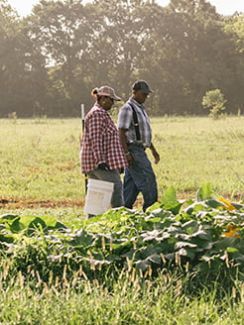
Second Harvest Food Bank of Greater New Orleans and Acadiana, Federation of Southern Cooperatives Land Assistance Fund, and Chenier Farms's Story
Louisiana
In the rural town of Opelousas, Louisiana, Chenier Farms – a Black-owned and operated farm – has been part of the community for five generations.
John Chenier lived on the farm as a child – now he and his wife Betty run the farm with help from their grandson, Seth. The farm has chickens, cows, and more. They grow okra, pumpkins and squash in the fall – and a bountiful harvest of fruit throughout the year. With rows of crops nestled between groves of trees, the farm is Betty’s sanctuary.
“It’s an uplifting feeling, knowing you’ve grown something from seed to crop,” Betty said. “It’s an overwhelming feeling of gratitude. It’s just peaceful.”
Despite Betty and John’s passion for farming, the reality is that their operation isn’t sustainable on its own. Until very recently, John was working a full-time job to help cover the family’s living and farming expenses.
“He still works when he comes back from work,” Betty said. “He gets off at 3:30 and is in the field until 8:30 or 9.” Black farmers like the Cheniers often face unfair challenges that other farmers do not – like discrimination and inequitable business practices.
“We’ve never had the same opportunity given to white farmers. We’re not informed about opportunities we could have had,” Betty said.
But, the Cheniers are hoping to change that. Working with Second Harvest Food Bank of Greater New Orleans and Acadiana, the farm is providing fresh, local produce to food pantries in the area. “(Farming) is vital to our food system and to our continued future in developing happier, healthier, more vibrant communities,” said Emily Slazer, the director of food sourcing at Second Harvest. “We don’t want this generation of farmers to be the last generation who is willing to take these challenges and continue this piece of who we are.”
Each week, the Cheniers harvest from rows of crops grown for Second Harvest. This produce is then distributed to local food pantries. In addition to providing fresh food to the community, the partnership is also helping ensure the farm stays sustainable in the long-term.
“(The food bank) has been a blessing to us because things were really tough at the time when they came and approached me,” Betty said.
Feeding America and Second Harvest’s work with Chenier Farms is just one example of co-creating solutions to food insecurity and addressing the health of the local community through the Food Security Equity Impact Fund. As we work to increase investments in communities through financial support and partnership, our hope is that the Equity Impact Fund serves as a model for how partners, supporters, and Feeding America can work together to achieve deeper impacts on communities working toward food security.

